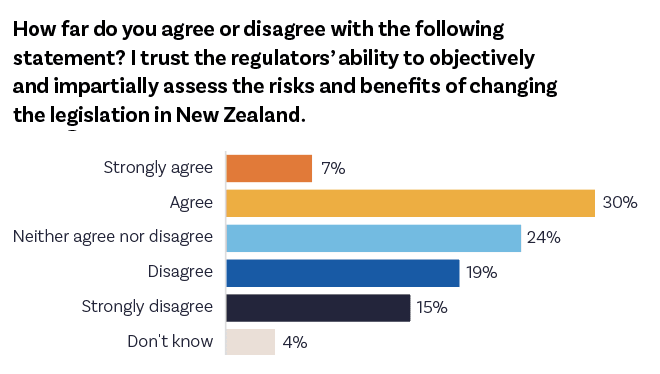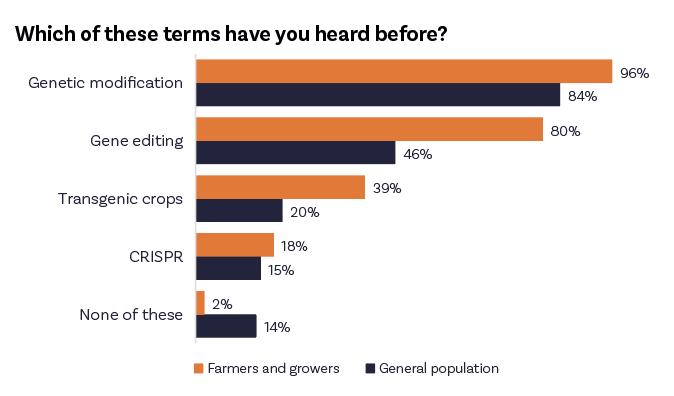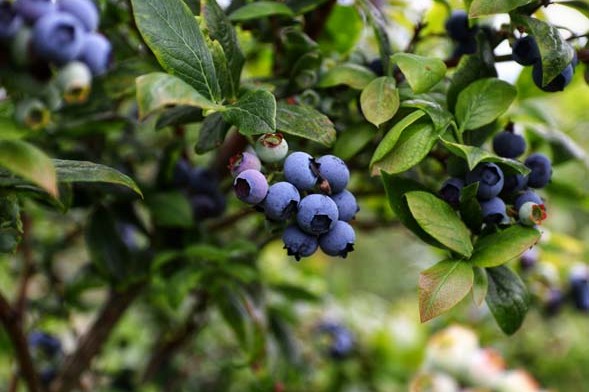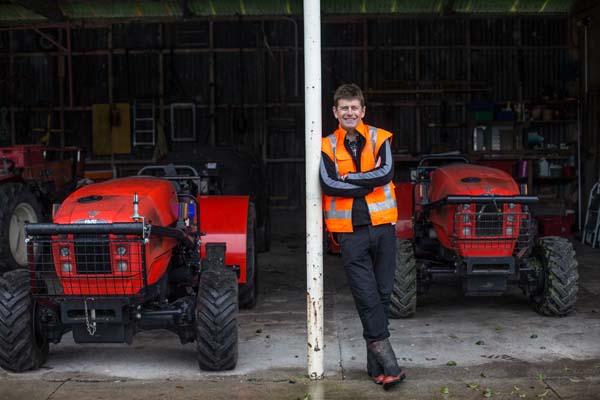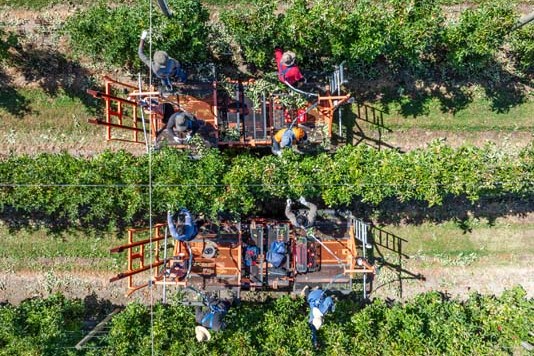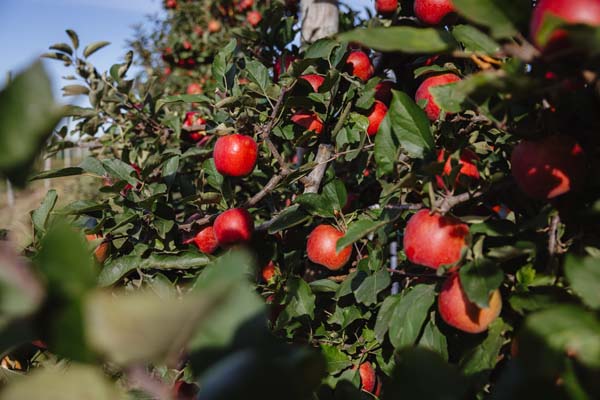Exclusive Survey: Genetic Modification – What do we know?
With increasing pressure on food production systems, New Zealand needs to find ways to move forward that are both sustainable and reliable. Words Liz Morley, Research First
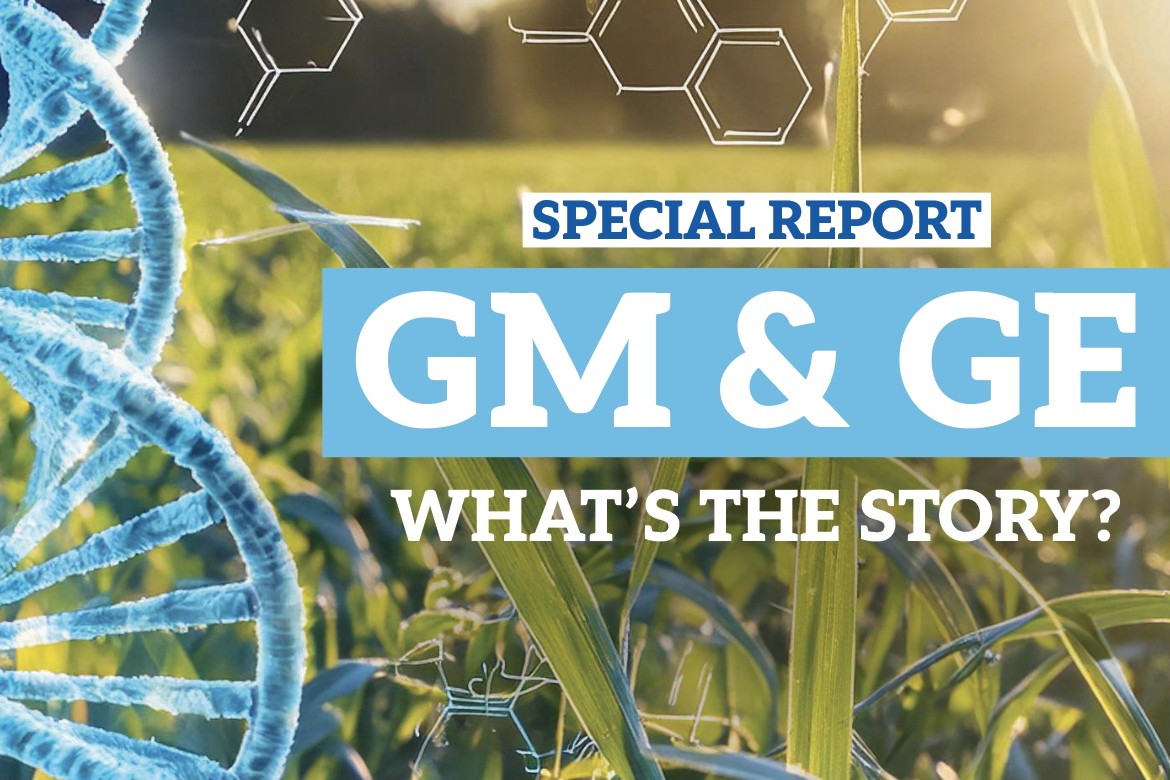
With increasing pressure on food production systems, New Zealand needs to find ways to move forward that are both sustainable and reliable. The National Party plans to overhaul NZ’s laws on genetic technologies to help combat some of these agricultural challenges, with new legislation due by the end of 2025.
National’s new regulations would end the effective ban on genetic engineering and genetic modification in NZ. The end of 2025 is not far off but to date there has been limited research into public acceptance of genetic engineering and modification, or into the attitudes of farmers and growers in NZ (who would be central to implementing these changes and affected by them)1.
Research First, NZ’s leading agricultural market research company, has conducted two surveys that help bridge these gaps. One with the general population (conducted in October 20232) and one with farmers and growers (conducted in May 20243 for Dairy Exporter).
1. There has also been little consultation with farmers and growers on changes to the legislation, despite our survey results showing that 95% believe that this is important. 2. Nationally representative sample of 382 New Zealanders. Data is statistically robust and has a maximum error margin of +/-5% at the 95% confidence level. 3. Representative sample of 524 farmers and growers with quotas placed by farm type and region. Data is statistically robust and has a maximum error margin of +/-4% at the 95% confidence level.
Awareness levels are higher amongst farmers and growers
Farmers and growers report higher levels of awareness of genetic engineering and genetic modification than the general population. When presented with a list of topics, one in seven (14%) of the general population said they hadn’t heard of any of them. Similarly, levels of awareness of “gene editing” and the more specific terms, transgenic crops and CRISPR, are significantly lower amongst the general population than amongst farmers and growers.
But knowledge levels are low amongst farmers and growers
Where awareness is relatively high amongst farmers and growers, knowledge levels are low. Significant proportions answered “don’t know” to identification questions. Only 7% believed that both GE and GM can change DNA by adding DNA from a different plant of animal, and just one third correctly identified that GE can change DNA without adding something new. The results from the general public survey showed most people are using GM and GE interchangeably and underlined just how much more education is needed.
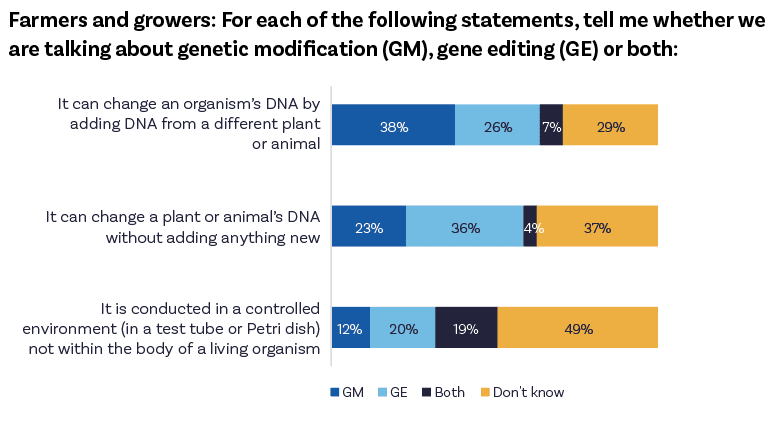
Public acceptance is significant
After being provided with a brief definition of GM and GE (to ensure we were talking about the same thing) a third of general public participants said they thought that GM food products would be of benefit to them or their family. Even more, almost half, agreed in the case of GE foods.
The key reason behind these choices is public demand for healthier, more nutritious foods, with public acceptance of biotech’s ability to boost nutrients and remove allergens. Economic concerns also feature, with consumers recognising an ability to achieve increased yields at lower prices, addressing concerns on the continuing drain on consumers’ pockets as well as addressing food shortages.
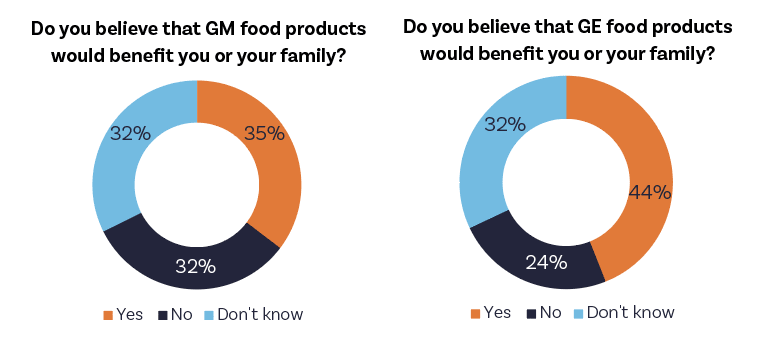 Biotech is also recognised in the need for food security, providing disease, pest and climate resistance alongside environmental sustainability goals of reducing reliance on chemicals. Two-thirds to three-quarters said that cheaper prices, less pesticide residue, and better nutrition would have at least some impact on them as drivers to purchase GM foods.
Biotech is also recognised in the need for food security, providing disease, pest and climate resistance alongside environmental sustainability goals of reducing reliance on chemicals. Two-thirds to three-quarters said that cheaper prices, less pesticide residue, and better nutrition would have at least some impact on them as drivers to purchase GM foods.
The key reason behind these choices is public demand for healthier, more nutritious foods, with public acceptance of biotech’s ability to boost nutrients and remove allergens.
But levels of acceptance differ by application
Previous studies completed by Research First have identified GM in fresh meat is seen as significantly less acceptable than GM fruit and vegetables.
To help consider the implications for primary production in NZ, these latest surveys used scenarios in which gene editing might be used, developed by The Royal Society Te Apārangi. Research First used these examples to test levels of support in principle. In all cases, the minority are in opposition.
Comparing the results between farmers and growers and the general population shows that the ranking of scenarios is broadly similar, with applications to improve pasture and feed being more acceptable with both groups than the use of gene editing in animals that are part of our food chain. But the use of gene editing trees to control invasive species is better supported by farmers and growers while the use of gene editing to protect taonga species ranked eighth for farmers and growers but fourth for the general population.
There were some variations by farm type, with dairy farmers tending to be more supportive of the scenarios on the whole. Dairy farmers were significantly more likely to be in support of gene editing in dairy cattle to make them less susceptible to heat stress, in pasture and feed crops to make them more easily digestible so as to reduce methane emissions and to improve pasture quality onfarm. They were also more likely to be in support of gene editing to protect taonga species.
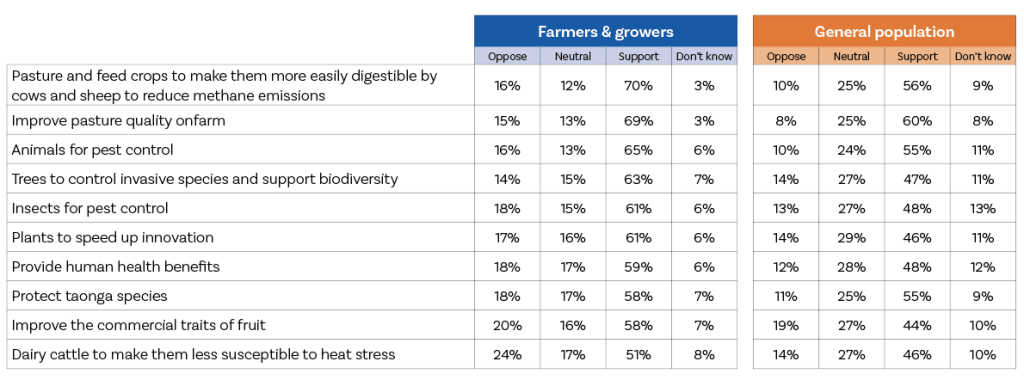
Opposition to GM and GE comes in many forms
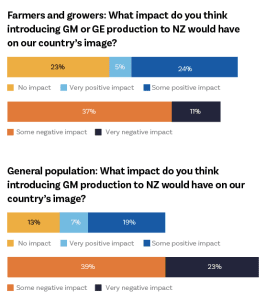 Those farmers and growers opposing gene editing for pasture and feed crops to reduce methane emissions reasoned that “it is not natural” and lack of information on the long-term effects make it high risk. Some were suspicious of the science and do not believe it can properly be controlled. Others do not believe that emissions need to be reduced or that improvements can be achieved without resorting to genetic engineering.
Those farmers and growers opposing gene editing for pasture and feed crops to reduce methane emissions reasoned that “it is not natural” and lack of information on the long-term effects make it high risk. Some were suspicious of the science and do not believe it can properly be controlled. Others do not believe that emissions need to be reduced or that improvements can be achieved without resorting to genetic engineering.
Those farmers and growers opposing gene editing for pasture and feed crops to reduce methane emissions reasoned that “it is not natural” and lack of information on the long-term effects make it high risk.
However, the impact on our country’s image was not front of mind to farmers and growers expressing reasons for opposition. In 2016, the Government clarified the regulations, indicating its decision was based on market perceptions considering NZ’s status as an exporter. Farmers and growers in 2024 are less likely to see a problem. Granted, two-fifths think there will be negative impacts. However, 52% believe there would either be no impact or a positive impact on NZ’s image with a legislation change.
Data from the general population in relation to GM shows a relatively high 39% also do not see a negative impact taking place.
Farmers and growers agree that the regulations need to be changed
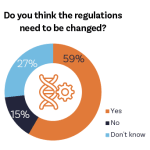 Given the levels of acceptance it is perhaps no surprise that 59% of farmers and growers agree that the regulations need to be changed. With a minority against, there is still a significant proportion that are yet to be convinced.
Given the levels of acceptance it is perhaps no surprise that 59% of farmers and growers agree that the regulations need to be changed. With a minority against, there is still a significant proportion that are yet to be convinced.
With knowledge levels low and a lack of visible information and consultation coming through, this is not surprising.
As a result, the call for widespread consultation on changes to the legislation could not be clearer. 93% of farmers and growers say it is important that they are involved in widespread consultation on changes to the legislation.
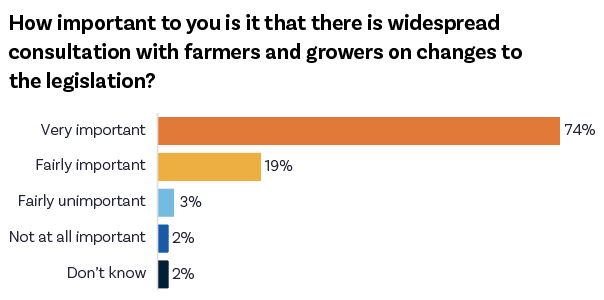
There is division though in the levels of trust and confidence in regulators’ ability to objectively and impartially assess the risks and benefits of changing the legislation in NZ. A third agree they have a level of trust whereas a third do not. Levels of distrust are higher amongst sheep, beef, and sheep and beef farmers but lower amongst dairy farmers.
